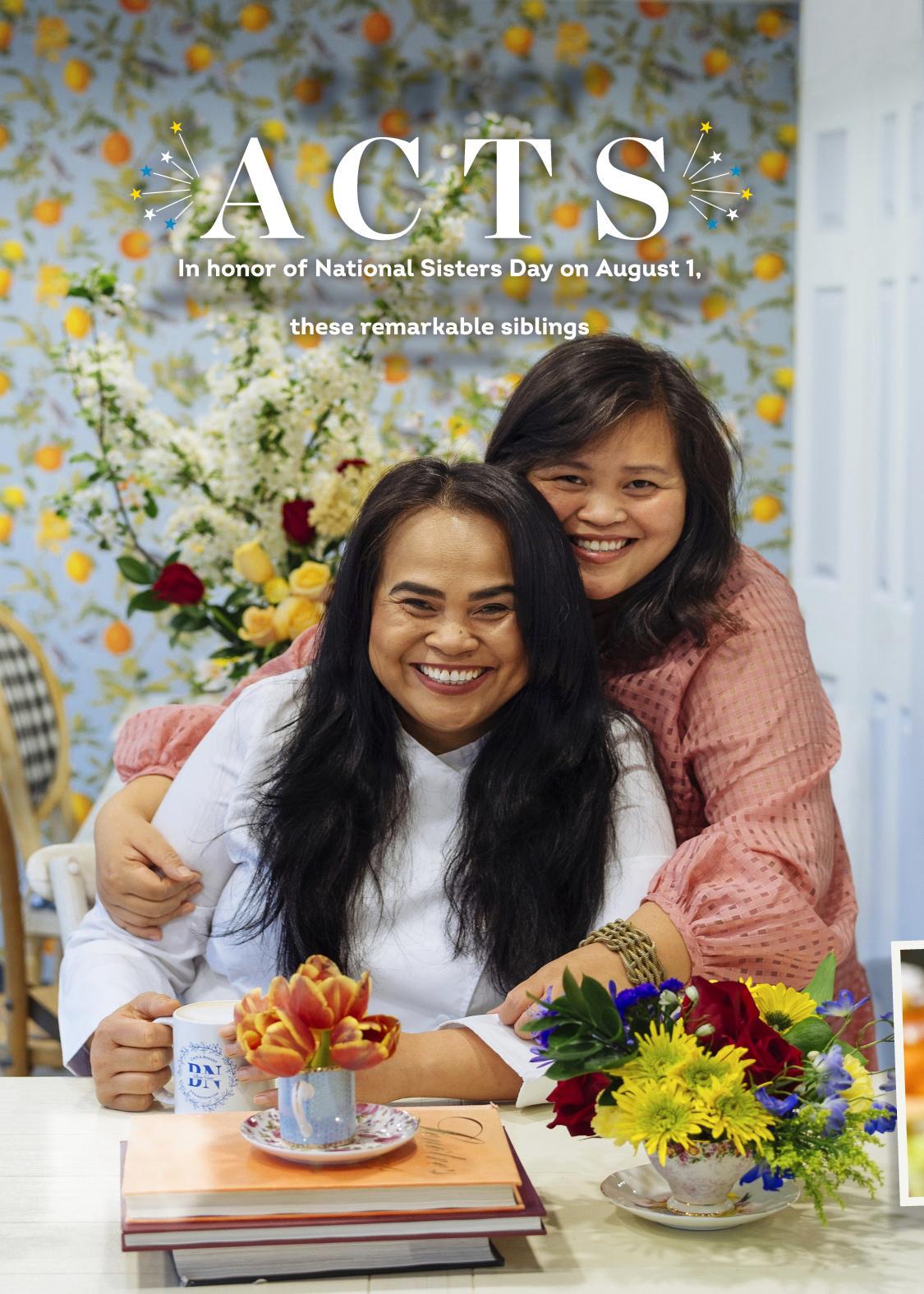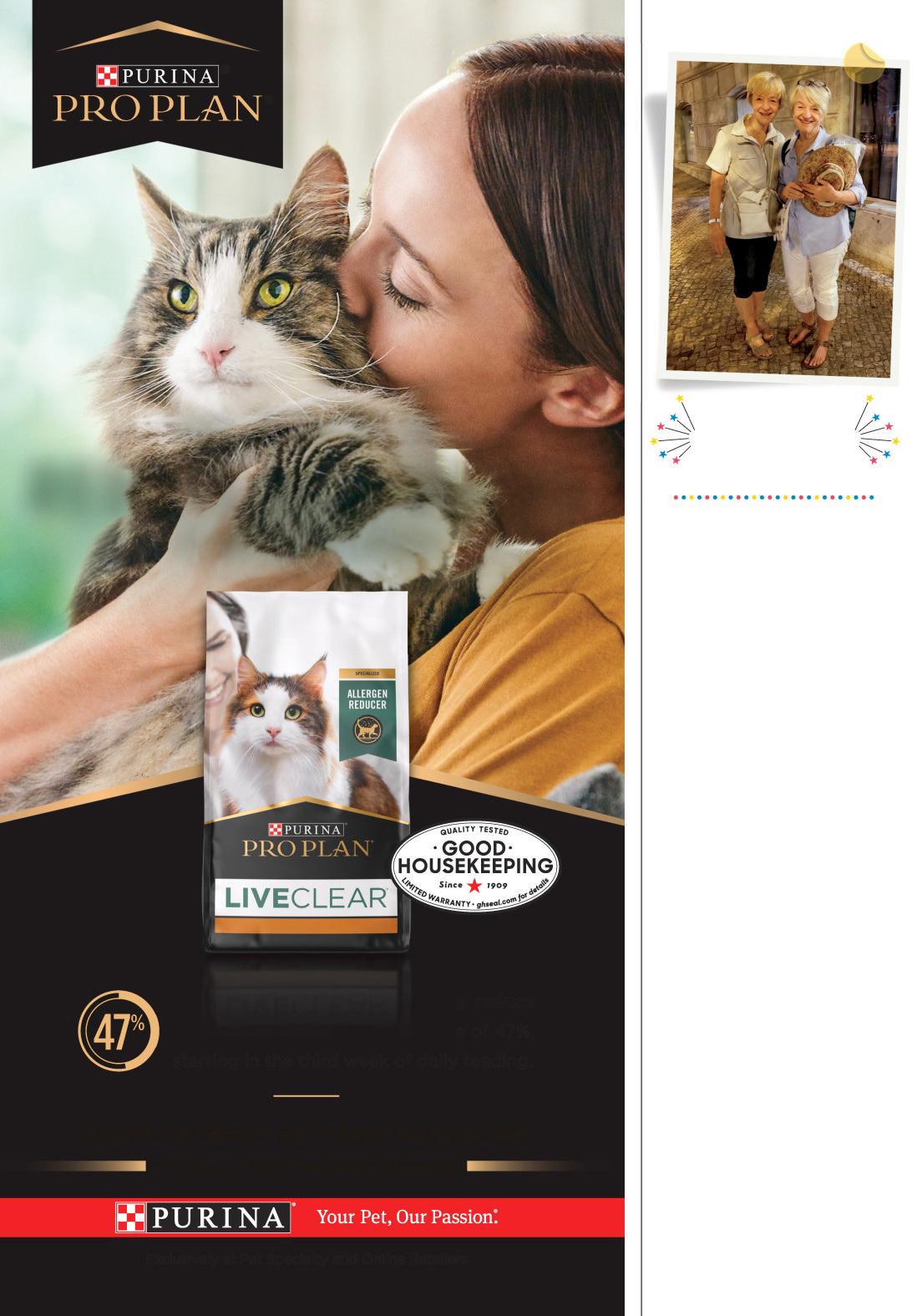
8 minute read
Finding joy
s i s t e r
we’re celebrating the unbreakable bond between
Advertisement
by Melody Warnick
When it came to opening the bakery, Khamla (right) told her sister Chan (left), “If our parents came here with six kids, not speaking the language, having no money, we can do this. ”

They’re standing up for their community.
Khamla Vorasane and Chan Graham
AVON, CT
On a Sunday this past March, Chan pulled on her apron at 3 a.m. in the kitchen of BouNom Bakery. Five days earlier, six Asian women had been shot in Atlanta. Chan was baking extra goodies, knowing that she and her sister Khamla, Laotian political asylum refugees from Texas, would donate the day ’ s profits from their FrenchSouthern bakery to fight a rising tide of hate crimes in the Asian American Pacific Islander (AAPI) community.
Racism had always singed the edges of their lives. Teachers ignored them; strangers joked about their slanted eyes; shop owners accused them of stealing. “We have to make our voices heard for all people of color, ” says Khamla.
Their mother used to tell a story about how, when she was fleeing Laos with her children, someone gave her a much-needed bag of rice. “The best time to give is when you have very little, because somebody else has absolutely nothing, ” she ’d say. That March Sunday, Khamla and Chan raised $4,200 for anti-racism nonprofits; soon they plan to create a scholarship at the University of Connecticut supporting the study of Asian history. “We have a little bit, ” says Chan, “but we want to give more to our community, to the people who need more than we do. ”
Despite opening just before the pandemic, BouNom Bakery has been wildly successful. Here, the bakery ’ s Raspberries Meringue Macaron.
F I N D I N G J O Y
S I S T E R AC T S
Maria (left) and Paula at Paula ’ s U.S. Army promotion to General Officer in 2019.
Meet the Army’s only sister generals.
Maria Barrett and Paula Lodi
SIERRA VISTA, AZ & SAN ANTONIO
Growing up, sisters Maria and Paula felt like opposites. Paula, now 53, slept through her alarm; Maria, 55, was an early riser. Paula was outgoing and athletic; Maria was the artsy, academic one.
The two of them eventually decided to join ROTC in college. When she was 11, Paula had watched a documentary about the first women at West Point and announced her plan to join the military over dinner; Maria just needed to pay for college. Both loved the Army enough to make it a career. “In retrospect, ” says Paula, “ maybe we had more in common than we gave ourselves credit for. ”
Since 2019, the sisters have even shared a job title: general (Maria is a Major General and Paula is a Brigadier General). They ’ re two of only 23 female generals in the Army—and the only ones in history who have been sisters. Naturally, they have different leadership styles: Paula, who proudly serves Army Medicine in Texas, is empathetic, while Maria, in charge of the Army
’ s Network Enterprise Technology Command (NETCOM) in Arizona, leans analytical. But they ’ ve gotten closer by turning to each other for support. “There ’ s not a big community of peers, ” says Maria,
F I N D I N G J O Y S I S T E R AC T S
Erika (left) and Krista after Arlo ’s birth.
From left: Krista, Andrea, and Erika at Erika ’ s wedding in 2010.

They volunteered to be surrogates for their sister.
Clockwise from left: Kai,
Evie, Ada, and Arlo.
Erika Ellis, Krista Cumberland, Andrea Ortiz
CHENEY, WA; SPOKANE, WA; WHITTIER, CA
From the start, the path to motherhood was fraught for Erika, now 35. Several miscarriages were followed by an ectopic pregnancy (when a fertilized egg implants outside the uterus). She and her husband, Scott, started fostering Kai, who had a heart condition, at 10 months old, and Evie, born with drugs in her system, at 10 days old, only to find out that Erika was pregnant with twins. When she lost the babies at 21 weeks ’ gestation, she spiraled into grief. “I knew I couldn ’t do it again, ” Erika says. “I couldn ’t go through pregnancy again, because I was just so exhausted and scared, and at that point our doctors really recommended against it. So I started looking up surrogacy. ”
That was when one of her older sisters stepped in. Krista, a 44-year-old teacher with two children, had watched Erika stumble through her pregnancy losses, “ so everything in me just wanted to do something to help and provide them with some piece of joy, ” she says. On vacation, Krista offered to carry Erika ’ s baby as a surrogate mom. At first Erika hesitated. What if the experience was as awful as her own pregnancies? A midwife urged her to say yes. closest thing to you, ” Erika remembers her advising, “ so why wouldn ’t you have your children grow in them?” A few months later, doctors implanted an embryo in Krista. Baby Arlo was born in August 2019.
When another sister, Andrea, 47, learned about the surrogacy, she thought, Oh, I would love to do that, but online research made her second-guess herself. Forget it—I’ m too old, she thought. But to her surprise, the clinic gave the go-ahead, and she was thrilled to carry baby Ada, born in February 2020. Between the births, the Ellises adopted their foster children, Kai and Evie; their household came to include four kids under 5 (as well as three cats, two dogs, two goats, and 13 chickens!).
The chaos is real, but doting aunts help. Arlo wants to call Krista every night; Ada crawls right into Andrea ’ s lap when she visits. When one of the kids takes their first steps or says their first word, Krista and Andrea rejoice too. “Both of them have become kind of like second mothers to these kids in different ways, ” says Erika.
. S I L L E A K I R E F O S Y E T R U O C : N E R D L I H C Y . H P A R G O T O H P H G A U B L A T E R A G R A M L : T A I P S O H Y . H P A R G O T O H P D O L O B N E B : G N I D D E W
T H E P O W E R T O R E D U C E A L L E R G E N S

I N C A T H A I R & D A N D E R
Pro Plan LiveClear was shown to reduce the major allergen by an average of 47%, starting in the third week of daily feeding.
Discover the freedom you and your cat could have. ProPlan.com/LiveClearChallenge
Diane (left) and Kit in Portugal.
Volunteering abroad keeps them close.
Katherine Prendergast and Diane Hawkins-Clark
RENO, NV & NEWBURYPORT, MA
Twin sisters Katherine (Kit), a leadership coach, and Diane, a therapist, have toured their fair share of European castles. At 69, they prefer more meaningful vacations, like planting a garden at a domestic violence shelter in Greece or teaching English to teenagers in Portugal. After Hurricane Katrina, the sisters, their husbands, and all four of their children converged on New Orleans to rescue displaced animals. “We embrace the opportunity to become part of the communities we serve, ” says Kit. “And we ’ re creating lifelong memories!” adds Diane.
The sisters find opportunities through the nonprofit Global Volunteers (globalvolunteers .org). In 2015, they built a schoolyard wall in Lima, Peru, and the students dipped their hands in paint to decorate the concrete, as did Kit and Diane. Knowing the wall is still there spurs them to volunteer again. “We ’ re accustomed to traveling together, and we have the same visions and the same passion, so it makes sense, ” says Diane. Adds Kit:

F I N D I N G J O Y S I S T E R AC T S
These teen twins want to end period poverty.
Brooke and Breanna Bennett
MONTGOMERY, AL
An estimated one in four women can ’t afford period products—and one in five girls has skipped school because of it. Brooke and Breanna never knew period poverty existed until they saw students asking their mom, Adeyela, an English teacher at all-female schools first in Dubai and then in Miami, for pads and tampons.
“Mom, why are they doing that?” Breanna asked.
“They don ’t have any, ” Adeyela replied.
To celebrate turning 12, Brooke and Breanna stuffed canvas bags with menstrual products and other hygiene-related items and gave them to a group of low-income young women. Word spread, and now, two years later, the Bennetts ’ nonprofit, Women in Training (WIT), packs and distributes 500 free WITKits each month.
Recently, Brooke, now 14, spoke at the Alabama State House to advocate having free pads and tampons offered at public schools statewide. The sisters ’ goal: Be sure no girl misses school or activities because she ’ s having her period. With WITKits, “they don ’t have to be embarrassed, ” says Breanna.
TAKE THE
See a difference. Or your money back. ProPlan.com/LiveClearChallenge





